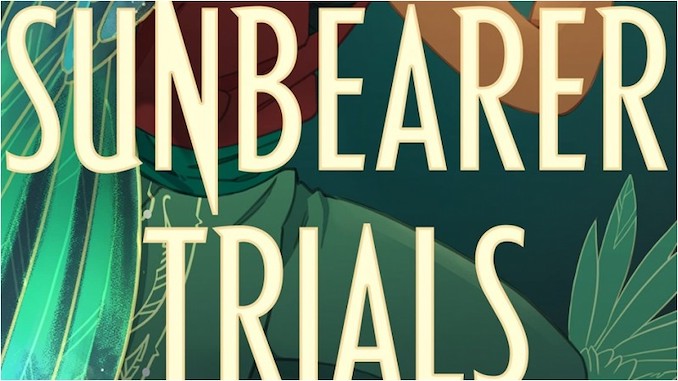Good Trouble in Aiden Thomas’s The Sunbearer Trials

It takes a strong person, and a strong protagonist, to speak up for what they believe, even when what they choose isn’t popular. But such protagonists don’t always see themselves as strong. In the case of Teo in The Sunbearer Trials, the newest YA fantasy from author Aiden Thomas, he only believes that he’s a troublemaker. And it takes him a long time in the story to realize that sometimes, a little trouble is needed. Sometimes, so-called “good trouble” (as the legendary Representative John Lewis termed it) is an absolutely necessary part of changing unjust systems. And Teo’s world needs a lot of change in order to be more just.
For The Sunbearer Trials (and its presumed sequel—be warned, the novel ends on a cliffhanger!), Thomas creates a secondary fantasy world that’s technologically similar to ours, but in which gods, demigods, and mortal humans openly walk together. Long ago, the sun god, Sol, sacrificed themself to save humans from the treacherous Obsidian gods, binding them into constellations to keep them from bringing chaos to the world. To keep Sol’s protections active, and to hold the Obsidians at bay, those known as semidioses, the children of the Gold and Jade gods, take part in the Sunbearer Trials. The winner, the Sunbearer, renews the sun stones in each temple with the blood of the loser, who is sacrificed in Sol’s image.
Teo, Jade semidios and son of the goddess Quetzal, thinks the whole thing is a raw deal. Jade gods are viewed as less powerful, and their children are sent to public school rather than the fancy Academy the Gold semidioses attend. Sol, still present within the sunstones, hardly ever chooses Jade semidioses to compete. As a result, Teo’s mostly concerned about the fate of his friend Niya, a super strong daughter of Dios Tierra who can change stone into weaponry with her will. Niya’s an obvious choice for one of the ten competitors—which means she could also be the one chosen to die.
What Teo doesn’t expect is to be one of the ten selected himself. He and another, younger Jade, Xio, are both named as competitors, the first time in anyone’s memory that two Jades have been chosen in one trial. Given their disadvantages as Jades, Teo’s angry at the unfairness of their inclusion—but he’s also determined that he, Xio, and Niya will all make it through to the end and survive, if only to show the Golds that they aren’t second rate citizens.
-

-

-

-

-

-

-

-

-

-

-

-

-

-

-

-

-

-

-

-

-

-

-

-

-

-

-

-

-

-

-

-

-

-

-

-

-

-

-

-








































